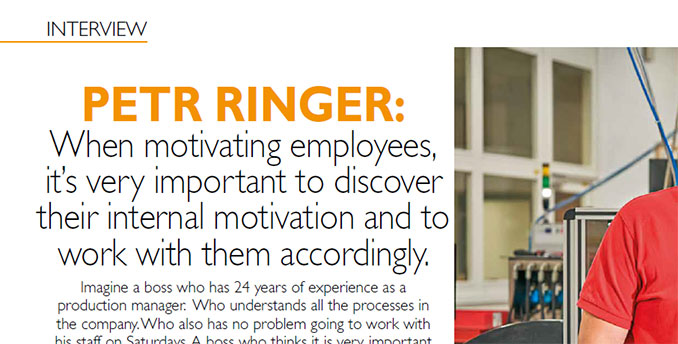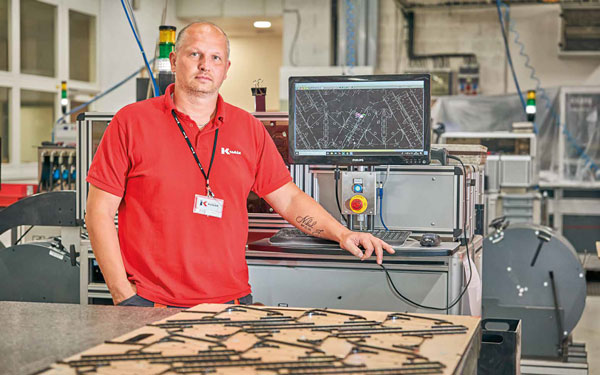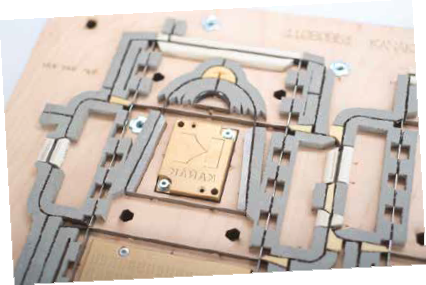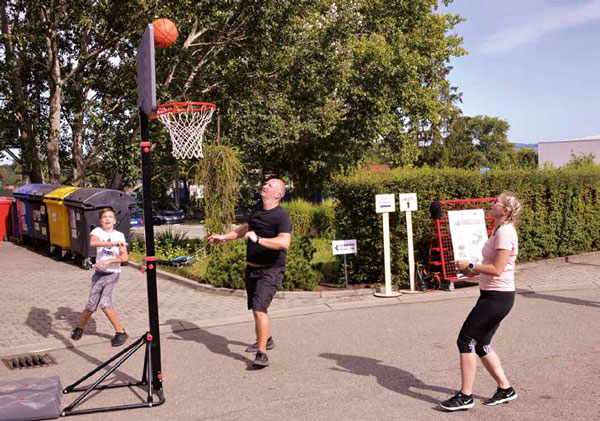
When motivating employees, it’s very important to discover their internal motivation and to work with them accordingly.
Imagine a boss who has 24 years of experience as a production manager. Who understands all the processes in the company. Who also has no problem going to work with his staff on Saturdays. A boss who thinks it is very important that all employees should have opportunities to grow as individuals and who, at the same time, is admirably soft-spoken. No, this is not a description of a character from a children’s fairy tale. I am talking about Petr Ringer, a real-life production manager from the Karel Kaňák, s.r.o. company. We interviewed Petr and here are his views on motivation.
For the benefit of those who don’t know the “Karel Kaňák” company, could you please briefly describe it.
We manufacture cutting tools that assist our clients in producing various types of containers – such as boxes for medicines, cosmetics or food, or for transportation of goods.
How many employees does your company have in total?

You don’t know what exactly is a cutting tool? You can imagine it like this.
Around 85.
And how many are there in your team?
At the moment, I have 40 people in my team.
You started at the company in 1996 and began by working in the production department as a machine technician. How did you work your way up to become the production manager?
The former director made me a foreman of a work shift team. After approximately a year, Mr. Kaňák asked me if I would be willing to lead the whole production department. My answer was: “Well, I can try it out, boss. If I fail, I will go back to the trenches”.
How did you fare as the new team leader in the production department? What were the biggest challenges?
My viewpoint was that the work simply had to get done – regardless of any considerations. I soon found out that not everyone had the same viewpoint. At the time, I really had little information on how to manage people. There were times when I got annoyed and had altercations with the staff. I just could not understand that certain people were not willing to do what was needed.
Since I came from the group of people I was leading, I could easily spot when staff tried to ignore work that needed to be done. However, when I pointed this out there was a strong reaction – almost mutiny.
We worried about the staff that we thought were
indispensable but when we looked back, we
realised that we were right not to compromise.
I suspect that the mutiny highlighted those that were not on board. Did you have to fire some staff?
Yes, I did. For example, we had to fire one of the employees because he would not change his attitude to his work. Even though originally, he was a fantastically hard-working person, he started refusing to do anything extra and was arrogant toward others. The moment he left, the mood of the department changed for the better. Immediately after he left, two young men in the production department had the opportunity to show what they could do, which they had not had before. After a couple of weeks, you didn’t notice that he was gone.
We had a few other cases like that. We worried about the staff that we thought were indispensable but when we looked back, we realised that we were right not to compromise. Those who thought they were irreplaceable are long gone and I can say that currently, we have a very healthy team.
How do you motivate your staff? What motivates them to remain in the company or in your team?

You don’t know what exactly is a cutting tool? You can imagine it like this.
That is a very difficult question. I try to work with each person individually. If I see that the person is capable of more and wants to grow, I provide the opportunities to do so. We have a few such people currently. For example, we have a colleague who started with glueing, and in a few weeks was learning how to operate CNC machines. On the other hand, some people have reached their peak and do a fantastic job and don’t want to grow more. In this case, it is about having a mutually friendly and respectful relationship. So, in motivating staff it’s very important to discover the inner person and to work accordingly.
Do you always provide opportunities for your staff to develop further? Does your company have the capacity to do that?
We try to develop staff as much as we can. Veterans, like me, have worked with all the different machines, so we know them well. But those who are new work only with one specific machine and have limited knowledge. One way to help them develop is to let them learn how to operate other machines – that way they will eventually be able to back each other up during holiday periods or sick leave.
The workflow is not always constant in the production department. Sometimes you have less work, and sometimes you have more work. Sometimes in order to meet the deadline we have to work overtime or weekends. How does the production manager deal with such situations?
It is always important to ask people. I seldom have to issue an order. The staff in our company are very willing to work. Often, they will see that something needs to be completed and they will initiate even working on a Sunday.
Now and then, when I hear my staff saying that they have to work on Saturday, I tell them:
“You know what guys? I will come with you.”
And they say: “You are kidding! You, the manager, will come to work with us?”
And I go work with them, and I can completely
clear my head while doing so.
What motivates you? Do you have some secret source of motivation?

Corporate sports day or events with families are already a tradition at Kaňák.
I simply enjoy the work. When you enjoy doing something and you have a lot of good people around you, this in itself is motivating. I really enjoy working with people. Now and then, when I hear my staff saying that they have to work on Saturday, I tell them: “You know what guys? I will come with you.” And they say: “You are kidding! You, the manager, will come to work with us?”
And I go work with them, and I can completely clear my head while doing so. I don’t have to handle people, manage, or give orders – I can simply bang with the hammer for eight hours.
Do you use Performia questionnaires in recruiting staff?
Yes, usually when hiring new people. My colleague, in the HR department, sends me all the applications and results and, based on this, we do the selection. Additionally, we always have the candidate try out the job for a week or two, in person. And, most importantly, the team then decides whether they want the person there.
With all this in place, there is no problem in motivating the team to work over the weekend.
If you could give one piece of advice for managers of Czech companies, on how to gain a well-motivated and working team, what would that be?
Appreciate your employees and thank them for their work. ■
PETR RINGER
 ■ Petr Ringer had studied to become a mechanic but when he started his first job, he felt he was back in Grade 1 again. He started working in Karel Kaňák, s.r.o. in 1996 as a machine technician in the production department. However, since the company was very small then, he wound up doing much more than that. He worked his way up from being a foreman of a work shift team to being the production manager. As a result, he knows all the production processes in his department. He cannot imagine doing anything else than working for Karel Kaňák, s.r.o.
■ Petr Ringer had studied to become a mechanic but when he started his first job, he felt he was back in Grade 1 again. He started working in Karel Kaňák, s.r.o. in 1996 as a machine technician in the production department. However, since the company was very small then, he wound up doing much more than that. He worked his way up from being a foreman of a work shift team to being the production manager. As a result, he knows all the production processes in his department. He cannot imagine doing anything else than working for Karel Kaňák, s.r.o.
He has a very successful marriage and family, and he considers this his biggest personal success. He relaxes from his day job when he goes to work on Saturdays – to help his staff in production. In his free time, he enjoys sports such as tennis and cycling.